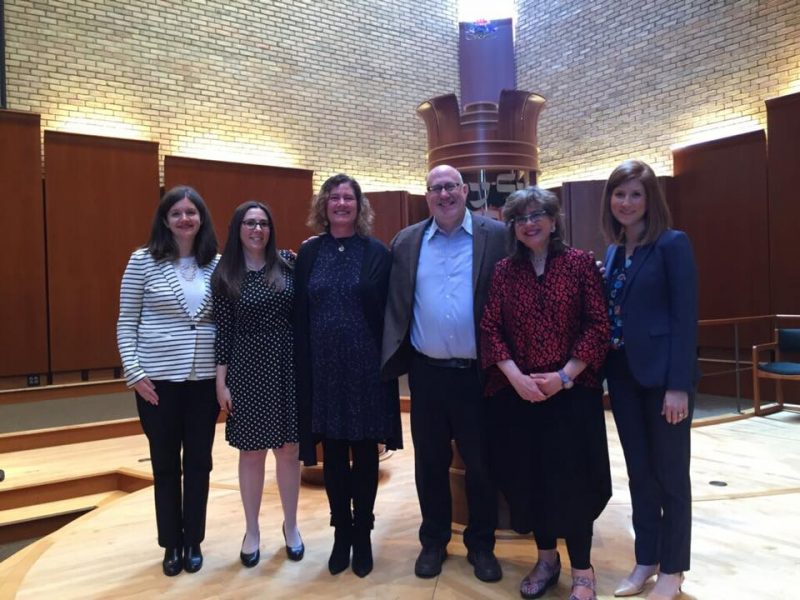Ari (Ballaban) Jun — In Conversation

Jews, Civil Rights, and the Holocaust: A Reflection
“What is the task? Not to forget, never to be indifferent to other people’s suffering.”
-Abraham Joshua Heschel
Rabbi Heschel‘s daughter, Dr. Susannah Heschel, shared reflections on the Holocaust and the Civil Rights Movement at the annual Hornstein Memorial Holocaust Lecture. Her father was one of a number of rabbis who were brought to the United States by Hebrew Union College-Jewish Institute of Religion during World War II. He went on to become a leading Jewish figure in the Civil Rights Movement; marching arm in arm with Dr. Martin Luther King, Jr. in Selma.
In connecting lessons learned from the Holocaust and the Civil Rights Movement, Dr. Susannah Heschel challenged the audience with what it means to truly remember. “Remembering is associated with doing,” she said. “We remember with action.”
“Redemption does not come to one people alone but only to all of us at once,” she said.
Those words still ring true today.
JCRC board member Penny Pensak shares her reflections on Heschel’s talk, which was sponsored by Wise Temple, the Center for Holocaust and Humanity Education, and the Hornstein family. CHHE has partnered with Wise Temple and the Hornstein family for the last decade to bring attention to these important stories and figures.
-Jackie Congedo
What makes an issue a Jewish one is becoming increasingly controversial within the Jewish community; it’s certainly one that the JCRC Board grapples with regularly. So it was extremely timely that Dr. Susannah Heschel, daughter of Rabbi Abraham Joshua Heschel, and herself an esteemed educator, spoke at a Hornstein Memorial Holocaust Lecture this May.
Dr. Heschel’s lecture, “Jews, Civil Rights, and the Holocaust,” took us on a journey that began with her own academic focus: Jewish-Christian relations in Germany during the 19th and 20th centuries, the history of biblical scholarship, and the history of antisemitism. She presented an unexpected array of viewpoints by Christian theologians in Nazi Germany regarding the Jews. She encouraged us to view contemporary events through the prism of history.
Dr. Heschel was most passionate when speaking about her father, his involvement in the Civil Rights Movement, and his intimate relationship with Dr. Martin Luther King, Jr. Her father’s commitment to civil rights was not disconnected from his Judaism. In fact, she made clear, repeatedly, that it was inextricably tied to his personal experiences during the Holocaust and his deep and profound religious beliefs as an Orthodox Jew.
It is in this context that she took on the discussion of what makes an issue a Jewish issue. Rabbi Heschel believed that protecting the human and civil rights of everyone is a mandate for the Jewish people. Issues like poverty, immigration, and education, therefore, become Jewish issues when a group is disparate from the majority simply because of that group’s race or religion.
Her closing, which featured a recording of her father delivering a speech the night before the march on Selma, was incredibly powerful. In Yiddish, and in a manner that was extremely unusual for him, she said, he spoke directly to us as Jews. He said that if we do not stand up for the human and civil rights of others, then in fact, our hearts and souls went up in smoke at Auschwitz as well as our bodies.
As we continue to address challenging issues in this increasingly divisive time, it is my hope that we will take these words to heart. As a pragmatist, and a member of the JCRC Board, I took special meaning from Dr. Heschel’s response to a question posed by someone in the audience that sought her opinion on what makes immigration, or racism, or poor education, a Jewish issue. While they are humanitarian issues we should be concerned about and respond to as Jews, they become Jewish issues because of the way they may affect us directly in the future. We need to continue to nurture relationships with others so that when we need them, and history proves someday we will, we have a proven record of standing with them at difficult times. If the role of the JCRC is to protect the Jewish people, we cannot accomplish this alone. We need allies.
The lives and careers of Drs. Lusia and Stephen Hornstein reflect hope and the best in what humanity can take from evil, despite their horrific Holocaust experiences. Lusia lost her entire immediate family in the Holocaust; Stephen lost both parents, two brothers, and a sister. They both escaped, and later met in medical school in Heidelberg, Germany. They became distinguished, prominent physicians in the United States, Lusia the Pediatric Director for Developmental Disabilities, and Stephen a Cincinnati Obstetrician-Gynecologist and teacher of sex education to medical students. Their sense of hope and resiliency, and the desire to serve others I see in both Dr. Heschel and her father as well.


It is quite surprising that a visionary like Luther was anti-Semitic to the point of influencing Hitler with his anti-Jewish ideologies. In his book ‘On Jews and Their Lies’, he says set fire to their synagogues or schools, destroy their houses, take away their prayer books and Talmudic writings and take from them all cash and treasure of silver and gold.
https://goo.gl/6BMwC3